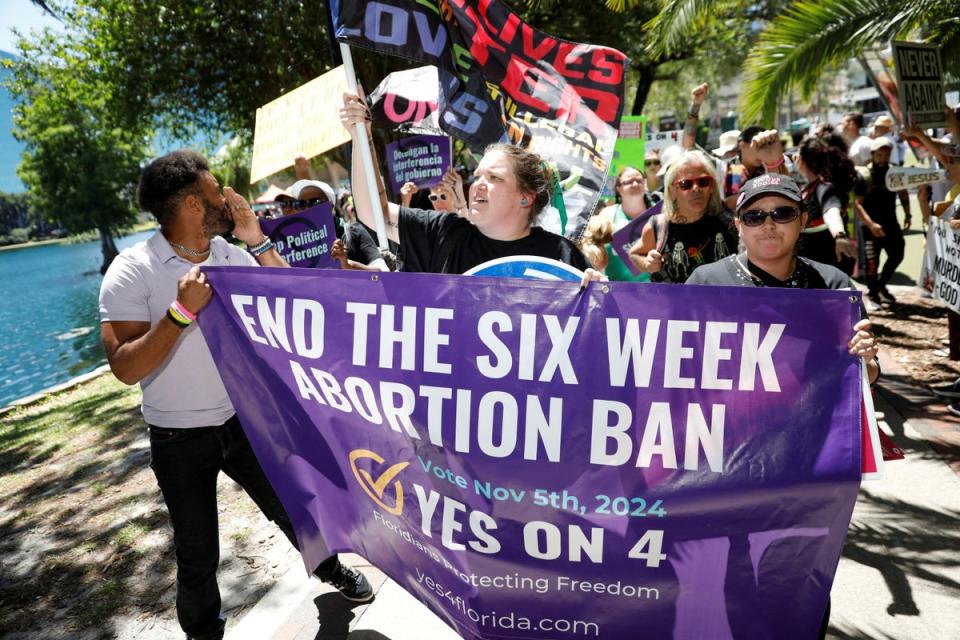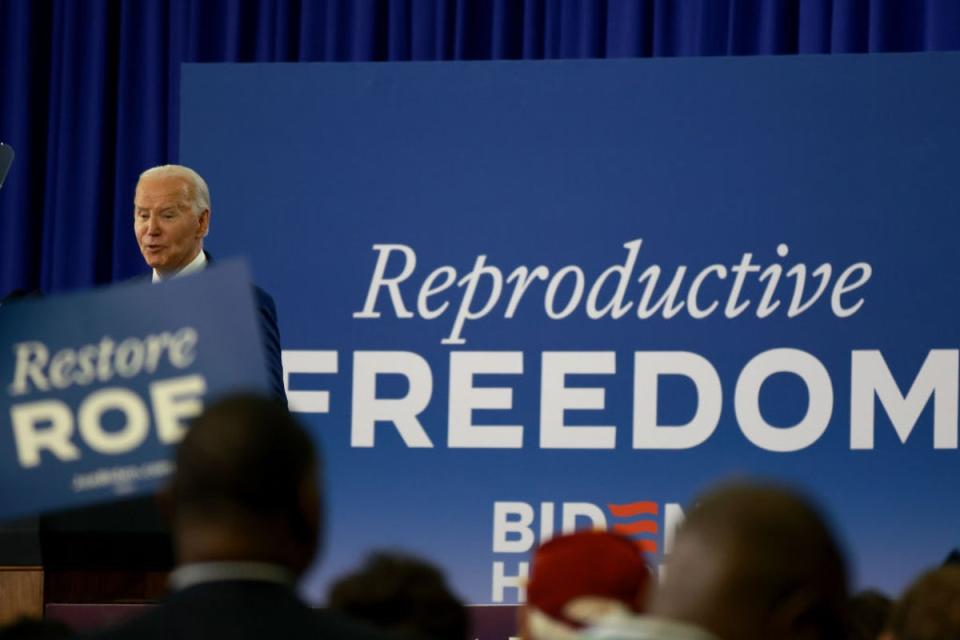Florida six-week abortion ban takes effect as opponents prepare for November showdown
Florida’s ban on abortion after six weeks of pregnancy went into effect on Wednesday, setting up the state as a major battleground over reproductive rights in the 2024 election.
The law, signed by Governor Ron DeSantis last year, will replace the existing 15-week ban in the state. The 15-week ban took effect earlier this year after a decision by Florida’s supreme court.
The state now joins its neighbors Alabama and Georgia in having one of the most restrictive abortion bans in the country.
Many women in Florida were scrambling to get appointments at clinics before the ban took effect, with doctors working to accomodate as many as possible, NPR reported.
"We're going to do everything we can to provide that care for as long as we're legally allowed to do so,” Dr Chelsea Daniels, a clinician with Planned Parenthood of Miami, said.

The ban now means that women in Florida will have to travel hundreds of miles for an abortion after six weeks. The closest state with looser restrictions is North Carolina, which has a 12-week ban.
At six weeks, many women do not know they are pregnant. Data from the US Centers for Disease Control and Prevention shows that roughly a third of all abortions take place during the first six weeks of the pregnancy.
Loopholes in the new Florida law will allow for abortions in cases of rape or incest until 15 weeks, or to save the life of a patient. But opponents argue that even in such drastic cases, such a law adds a layer of uncertainty and fear to medical decisions that will harm women in both the short, and long-term.
Democrats are expected to make the abortion ban front and center of their appeals to Florida voters ahead of elections later this year.
President Biden traveled to Florida last month to campaign with fellow Democrats against the GOP-led abortion ban.
One of those Florida Democrats is Debbie Wasserman Schultz, former chair of the Democratic National Committee, who spoke about the ban coming into effect withThe Independent on Tuesday.
“If you want to understand what Donald Trump means when he says he’s going to leave it to the states, the Maga extremist abortion ban that begins tomorrow is going to be a near total abortion ban that will put the judges, politicians and the governments in the middle of deeply personal healthcare decision,” she said.

Republicans seem to have been caught off-guard by the overturn of Roe vs Wade, the landmark Supreme Court decision protecting abortion rights.
The party has yet to coalesce around whether or not to pursue an abortion ban at the national level. Presumptive Republican presidential nominee, Donald Trump, and others facing tough races this fall, have begun backing away from more restrictive bans and legislation pushed by conservatives.
The former president has come out against national legislation banning abortion amid questions of whether he would sign such a bill into law.
In an interview published on Tuesday with Time Magazine, Mr Trump backed away from some of the extreme GOP positions on abortion, and argued that his opposition to Roe stemmed from the federal standard it set for all states to follow.
“You don’t need a federal ban. We just got out of the federal. You know, if you go back on Roe v. Wade, Roe v. Wade was all about—it wasn't about abortion so much as bringing it back to the states,” he said.
Mr Trump also denied that a national abortion ban was politically possible in the current moment.
”You have to remember this: There will never be that chance because it won't happen,” he told Time. “You're never going to have 60 votes [in the Senate]. You're not going to have it for many, many years, whether it be Democrat or Republican.”
The White House condemned the Florida law upon its passage in April 2023.
“This ban would prevent four million Florida women of reproductive age from accessing abortion care after six weeks — before many women even know they’re pregnant,” White House press secretary Karine Jean-Pierre said last year.
“This ban would also impact the nearly 15 million women of reproductive age who live in abortion-banning states throughout the South, many of whom have previously relied on travel to Florida as an option to access care.”
Florida Democratic Party chair Nikki Fried told The Independent in April that the fight for abortion rights in the state will be central to their messaging in 2024. Though Florida’s race for governor is not taking place this year, the state is home to a key Senate race as Republican Rick Scott seeks to defend his seat.
Ms Fried described the Democrats’ message in Florida as centred on the “three As: affordability, accountability and abortion”.
“All eyes are back on Florida,” she said. “We think that because of all of the moments that we’re in at this time … we’re going to be able to not only be competitive but to be able to flip a lot more seats in a lot more areas than people would have expected.”